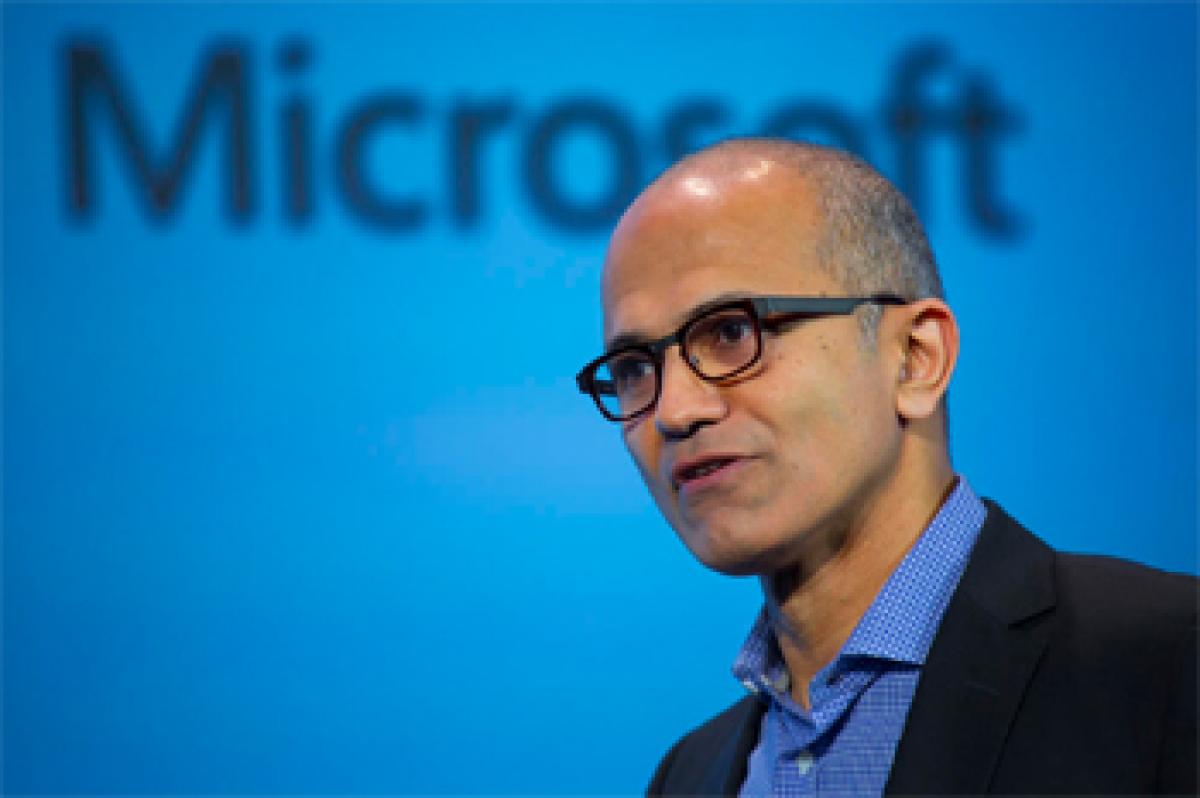Live
- Financial Intelligence Unit detects undisclosed income worth Rs 11,000 crore in 2024: Centre
- Odisha BJP chief to be elected in January
- AP Home Minister Anitha alerts officials amid rains in heavy Rains in Tirupati
- Taluk Guarantee panel
- Uber Launches Uber Moto Women for Safer and Flexible Rides in Bengaluru
- ‘Fear’ pre-release event creates waves
- Champions Trophy 2025 Host Change? Indian Broadcaster's Promo Sparks Controversy
- Nabha Natesh introduced as Sundara Valli from ‘Swayambhu’
- Aamir Khan praises Upendra's ‘UI: The Movie’ ahead of its release
- Celebrations: Keerthy Suresh ties the knot with Antony Thattil
Just In
Nadella team making every effort to ensure Microsoft office stays relevant in changing world


It\'s been a while since teenagers thought Facebook was cool, but they still use it more than any other social site.Similarly, the most exciting thing to happen to Microsoft Office in the last ten years was probably the demise of Clippy, and yet it\'s still the center of many millions of people\'s working life, even amid mounting competition from the likes of Google and Slack.
It's been a while since teenagers thought Facebook was cool, but they still use it more than any other social site.Similarly, the most exciting thing to happen to Microsoft Office in the last ten years was probably the demise of Clippy, and yet it's still the center of many millions of people's working life, even amid mounting competition from the likes of Google and Slack.
"I think people don't understand how much it's loved," says Julie Larson-Green, chief experience officer of Microsoft Office.
To meet that competitive threat, Microsoft CEO Satya Nadella has ensured that Office comes to every device under the sun, from the Windows PC to the Mac to the iPhone and Android.
At this week's Microsoft Build event, the company showcased various efforts designed to make sure that Office stays relevant in a changing world. And although Microsoft did not explicitly mention Facebook as a template for its strategy, there are many obvious parallels between the social network and Microsoft's gameplan for Office.
The key is in fully taking advantage of all the data that Microsoft Office has locked up among its billion-plus users, the same way Facebook did to turn into the behemoth it is today. And if it pulls this off, Microsoft will have made Office just as hard to displace as Facebook.
The Facebook connection
One of the huge advantages that Facebook has over everybody else is how well it's turned its data into a competitive weapon. Facebook takes all of your publicly-facing photos, videos, likes, and shares, and turns it into something that's easy for its billion-plus members to browse and search.
That same data is also available to any of the many apps with Facebook integration. A great example are the many games that automatically tell you which of your Facebook friends are also playing. It doesn't do anything you couldn't do for yourself by hand by manually adding their info, but it saves a lot of time.
This has the added benefit of keeping people on Facebook, even after it stops being cool. Maybe you could live without the core Facebook newsfeed, but the ability to have one-click login into services like Pinterest, Spotify, and Tinder and have all your friends already there is powerful.
Now, Microsoft appears to be taking a page out of the same playbook.
Microsoft's search for the graph
Microsoft Office is, maybe, a lot less fun than all of that. But just like Facebook's Graph, it's a treasure trove of data that can be used in ever-more-interesting new ways. And instead of your friends and photos, it's your coworkers and documents that can and will follow you around.
The company calls this the Microsoft Graph, and it became available to developers late last year.
At Build this year, Microsoft showed off how DocuSign, a popular document-signing service for the workplace, uses the Microsoft Graph: If you're signed into the DocuSign site with your Office account, it can automatically fill in a coworker's name from your contacts, and then save a copy of the signed document in your team's SharePoint.
No, it's not very "fun" by most standards. But it means that Office can go everywhere and be everywhere, with everything you do feeding more data into the Microsoft Graph. On a PC, tablet, iPhone, or HoloLens holographic goggles, everything you do reads information from Office, and writes more data back into the Microsoft Graph.
It means "more intelligence throughout" Office, Larson-Green says.
A new Starbucks app that integrates with Outlook.
In the short term, it means more apps and add-ins for Office that can integrate data from outside places, making the whole thing a little smarter.
Looking to the (far) future, it means that if you have a Windows 10-powered connected coffee machine, the Microsoft Graph could learn everybody in an office's drink order, and have it automatically appended to a meeting invitation in Outlook.
Again: Nothing you couldn't do yourself. But the more data Office takes in, the more stuff it can do for you automatically, leaving you to focus less on sending e-mails asking if they can sign a form, and more time just getting stuff done.
"I'm excited because it helps people do more with Office," says Larson-Green.
The challenge ahead is getting developers to build apps that integrate with Office and the Microsoft Graph. But if it succeeds, it'll do for the workplace and productivity what Facebook did for leisure time on a smartphone. And a data-driven Microsoft Office will be just as hard to displace as Facebook has proven itself to be.
Source:Techgig

© 2024 Hyderabad Media House Limited/The Hans India. All rights reserved. Powered by hocalwire.com






